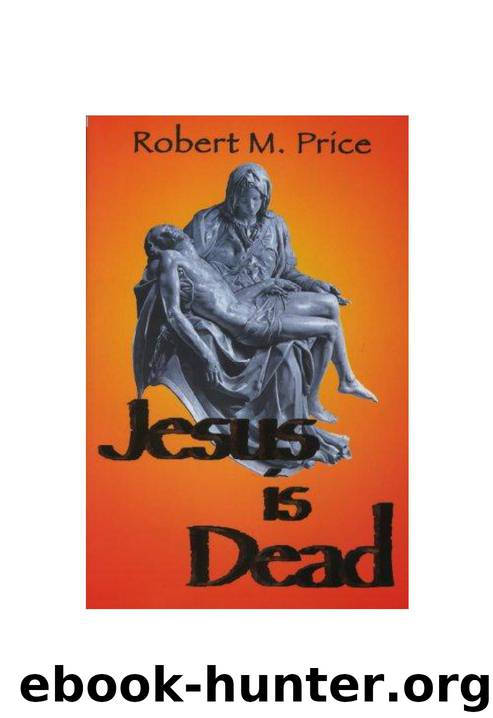Jesus Is Dead by Price Robert M

Author:Price, Robert M. [Price, Robert M.]
Language: eng
Format: mobi, epub
Tags: Controversial Literature, The Gospels & Acts, Historicity, Jesus Christ, Literature & the Arts, Christianity, Religion, Jesus Christ-Resurrection, General, Resurrection, Biblical Studies, Christology, Jesus, Christian Theology
ISBN: 9781578840007
Publisher: American Atheist Press
Published: 2012-02-06T16:00:00+00:00
Gregory J. Riley’s
Resurrection Reconsidered
Thomas and John in Controversy
(Fortress, 1995)
John versus Thomas
I think those biblical scholars serve us best who cause us, like an unpredictable old Zen master, to view familiar things in a different way. Gregory J. Riley does the trick pretty well in Resurrection Reconsidered: Thomas and John in Controversy. He tries to demonstrate the dialogical relationship of the gospels of John and Thomas, reflecting the disputations of the communities supposed to have produced the two documents. The book is a wonderful example of the great utility of those gospels and revelations banned by fourth-century inquisitors and hidden away by desert monks to await rediscovery in 1945 in Chenoboskion, Egypt. The Gospel of Thomas is one of the Nag Hammadi texts, the surface of which has scarcely been scratched for all the attention paid them. Riley shows how illuminating the texts anciently excluded from the canon of official scripture can be for the ones included. One begins to see how the very fact of a canonical selection not only conceals the teaching of the one group of texts but distorts our understanding of the other.
Thomas, as Riley reads it, makes John sound suddenly quite different. It is as if we had finally gotten hold of the transcript of the other side of a phone conversation we had heard and long puzzled over. It is a shame that Riley’s sharp-eyed book did not attain the public acclaim of Elaine Pagels’s 2004 volume Beyond Belief: The Secret Gospel of Thomas the central chapter of which seems wholly derivative from Riley’s and without acknowledging it.
Riley reminds us of the Fourth Gospel’s co-optative use of John the Baptist, to make a rival sect’s figurehead seem to espouse the Christian view instead. Shouldn’t it be just as obvious that John’s pointed use of Thomas as a doubter {148} of correct belief, lately converted to the same, is of a piece with the polemical rewriting of the Baptist? Just as John the Baptist symbolizes the Baptist sect, Doubting Thomas stands for Thomasine Christianity. And the chief points of Thomasine ‘heresy’ are targeted in the scenes in which John features Thomas.
Chief among the points over which they differed was the fleshly reality of the resurrection of Jesus. Riley provides an interesting survey of ancient Israelite, Jewish, Hellenistic, and Christian belief about the fate of the dead. From these data emerge the assessment that the notion of fleshly resurrection emerged late and piecemeal within some strands of Judaism, was unheard of everywhere else, and dominant in no form of Judaism or Christianity we know of until formative Catholic Orthodoxy mainstreamed the belief in the second century and later. Riley shows that those polemicists who did accept the doctrine had fellow Christians, not just outsiders, to argue with.
Many converts to the Christian faith naturally interpreted their belief according to their inherited assumptions and thus believed Jesus had risen in spiritual form. (1 Corinthians 15 and 1 Peter 3:18 certainly seem to presuppose the spiritual body version of resurrection.)
Download
This site does not store any files on its server. We only index and link to content provided by other sites. Please contact the content providers to delete copyright contents if any and email us, we'll remove relevant links or contents immediately.
The Secret Power of Speaking God's Word by Joyce Meyer(3218)
Signature in the Cell: DNA and the Evidence for Intelligent Design by Stephen C. Meyer(3138)
Real Sex by Lauren F. Winner(3022)
The Holy Spirit by Billy Graham(2952)
The Gnostic Gospels by Pagels Elaine(2531)
Jesus by Paul Johnson(2362)
Devil, The by Almond Philip C(2331)
23:27 by H. L. Roberts(2250)
The Nativity by Geza Vermes(2230)
Chosen by God by R. C. Sproul(2164)
All Things New by John Eldredge(2162)
Angels of God: The Bible, the Church and the Heavenly Hosts by Mike Aquilina(1969)
The Return of the Gods by Erich von Daniken(1945)
Angels by Billy Graham(1926)
Knowing God by J.I. Packer(1858)
Jesus of Nazareth by Joseph Ratzinger(1811)
The Gnostic Gospel of St. Thomas by Tau Malachi(1798)
Evidence of the Afterlife by Jeffrey Long(1790)
How To Be Born Again by Billy Graham(1781)
